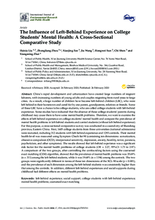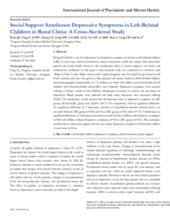Displaying 71 - 80 of 195
This study examined the effects of left-behind experience on college students’ mental health and compared the prevalence of mental health problems in left-behind students and control students (without left-behind experience) in China.
This study examined the association between parental migration and early childhood nutrition of left-behind children (LBC) in rural China.
This study examined the association between parental migration and early childhood nutrition of left-behind children (LBC) in rural China.
This study aimed to evaluate the effectiveness of the Happy Parenting: Round-the-Clock Parenting (HPRCP) program for Macau parents on shift work, using randomized controlled trial design.
In this paper a cross-sectional study was conducted in a common rural village in China to examine the amelioration effect of social support for left-behind children (LBC).
This study aimed to survey the extent of social anxiety in rural left-behind children in China, reveal the relationship of social anxiety to family cohesion and adaptability, and provide a theoretical basis for health intervention.
This study zeroes in on the issue of left-behind children and draws on data from the China Family Panel Studies surveys to examine the impacts of parental absence on child development in psychological, physical and cognitive domains.
This study aimed to investigate the impact of previous maternal migration experiences on left-behind children’s (LBC) mental health status and suicidal ideation, and the possible mediating role of parent-child communication.
In this paper, the authors examined if high socio-economic status (SES) of families had an effect on youth’s adjustment by comparing 226 internationally adopted female Chinese youth who experienced pre-adoption institutionalization with 1059 non-adopted Chinese peers living in China, as well as 209 non-adopted American peers.
This study investigated whether parental stress was associated with parenting and whether this relationship was mediated by social support in a sample of 255 Chinese immigrant parents from the Survey of Asian American Families in New York City.



